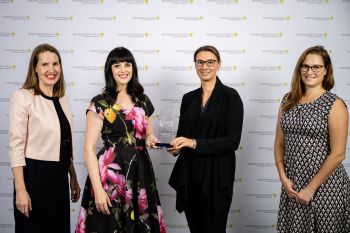Diversity, Equity and Inclusion
Despite the idealistic humanistic vision of equity between all individuals of the human population, societies and academic institutions still lack homogenous access to education, opportunities and chances. Thus, the educational system and subsequently workplaces are depleted of diversity in terms of gender, ethnicity and ultimately and most importantly: mindsets.
I am a strong advocate for progressive change. Since change can only be implemented by action, I have developed and organized a new event series called "STEM fatale" at the Institute of Science and Technology Austria (ISTA) starting in 2019. The series aims to highlight successful women in STEM and provide an informal platform for ISTA’s women scientists to exchange experiences and how to overcome (not only) gender-related obstacles in career trajectories.
My enthusiasm in advocating for diversity, equity and inclusion has gained further notice by national media and international events. I have been invited as panelist to several Austrian Embassies on the topic of ‘Women and Girls in Science’ and I regularly serve as a woman scientist role model in schools, during public science events, in workshops hosted by the Vienna Business Agency, and in ‘Zoom a Scientist’ sessions organized by ISTA. Altogether, these invitations and activities underline how relevant and essential the proactive representation of women scientist is to contribute to a societal change towards a more equitable future for young children.
Personally, I am highly supportive to every individual independent of status, gender, ethnicity or origin. I am very much in favor of the humanistic approach believing in the progress of science and equality. A nurturing environment is key to perpetuate those values and make them accessible to everyone. Therefore I have been a supervisor and mentor for several students, particularly trainees from a minority background. By communicating to my students that I believe and trust in their lab and learning skills, their capabilities in asking scientific questions and subsequently forming independent research ideas, I experienced that their confidence in themselves has constantly grown and ultimately encouraged them to make remarkable progress in their scientific careers. I am personally very proud to have seen them thrive under my guidance and leadership, which empowered them to fully explore and display all of their talents.
The STEM fatale Initiative

Given the highly positive feedback for the STEM fatale events at ISTA, I took the concept one step further and founded “The STEM fatale Initiative” in 2020. The STEM fatale initiative is a platform that aims to become an established network throughout Austria, and as a next step to globally connect STEM women enabling exchange amongst peers as well as foster career promotion and personal development opportunities. Our team currently consists of seven women and one man, all from diverse STEM disciplines and professions. Under my leadership, The STEM fatale Initiative has received the “wissen schaf[f] zukunft” research award from the State of Lower Austria in the category “Call for Concept” in 2020.
We incorporate an important scientific aspect into our initiative: data collection, data analysis and publication. Currently we are analyzing a survey with the goal to determine professional, societal, structural and personal factors impacting women’s careers in STEM. This data will not only be published and presented to political, educational and institutional decision makers, but will also provide us with clear priorities in offering workshops, coaching and mentoring to help women to aspire for more leadership positions in STEM.
Raising awareness of the issues of gender equality, diversity, inclusion, bias and stereotypes is very important to the entire STEM fatale Initiative team. Thus, we have grown and recently published an essay on equality, diversity and inclusion in the scientific journal "Journal of Cell Science". For this essay, my co-authors Dr. Melissa Stouffer and Dr. Irene Vercellino have conducted interviews with ISTA professors to present their perspective on the topic of equality, diversity and inclusion in the research area, as well as to illuminate their own perspectives and experiences on this topic. In this way, the STEM fatale Initiative also contributes to raising awareness in the scientific environment and to proposing solutions to create a work environment that promotes diversity.